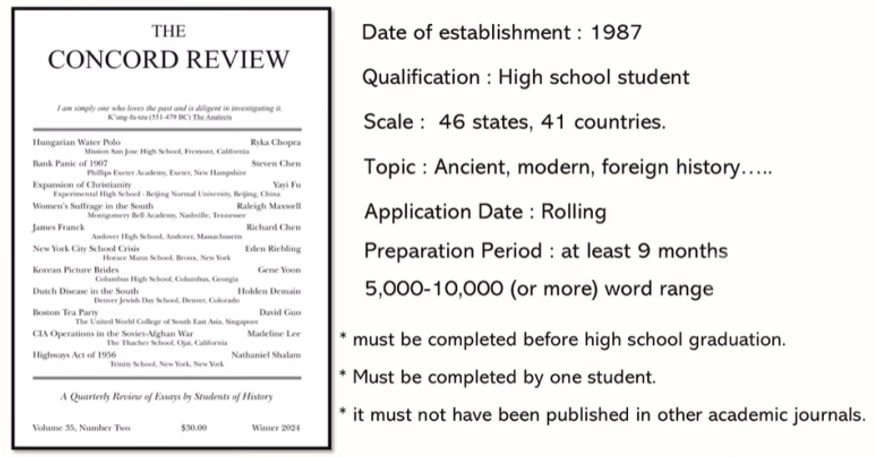The Value of The Concord Review

The Concord Review is a renowned academic journal that features historical research papers written by high school students. Considered the most respected publication of its kind, it provides an elite platform for young historians.
If you’re passionate about history, submitting to this journal is an excellent goal. Let’s go over how to prepare.
What Makes The Concord Review Stand Out

Published quarterly, The Concord Review invites high school students from around the world to submit in-depth historical essays. According to 2021 data, students published in the journal have gone on to attend top-tier universities like Brown, Columbia, Cornell, Dartmouth, Oxford, UPenn, Princeton, Stanford, and Yale. Though updated statistics haven’t been released since then, the journal’s strong reputation continues to influence admissions outcomes positively.
Some essays are even recognized with prestigious honors such as the Fitzhugh Prize or the Emerson Prize. Winning one of these can offer an even greater boost during the college admissions process. Having a paper published in The Concord Review is often likened to reaching the highest levels of success in competitions like the AMC math contest.
Thinking of submitting? Here’s what you need to know.
Submission Requirements for The Concord Review
-
Eligibility: Open to current high school students only.
-
Global Access: Students from 46 U.S. states and various countries are eligible to apply.
-
Topic Flexibility: Any subject in history—ancient, medieval, or modern—is acceptable.
-
Deadlines: Submissions are accepted four times a year—February 1, May 1, August 1, and November 1.
-
Word Count: The required length is now 5,000–10,000 words (up from the previous 4,000–6,000).
-
Preparation Time: Substantial time and effort are required and vary by student.
Publishing in this journal is an exceptional academic achievement. So, how should you prepare?
What Not to Do When Preparing Your Paper
Understanding what to avoid is just as important as knowing what to do. Let’s begin with common mistakes that can undermine your submission:
-
Narrative Without Analysis
Avoid merely recounting historical events. A descriptive overview of the Industrial Revolution, for instance, won’t suffice. Instead, explore the significance and consequences of the event. -
Current Issues Without Historical Framework
Steer clear of discussing contemporary politics without grounding them in historical context. For example, instead of focusing solely on U.S.-China tensions, link your topic to events like the Opium Wars to add depth and context. -
Overreliance on Secondary Sources
Prioritize primary sources—original documents, speeches, policy papers. While academic articles and news reports can support your argument, they should not form its foundation. -
Topics That Are Too Broad or Too Narrow
A subject like “The Development of Democracy Worldwide” is too vast, while one like “The March 14, 1965, Selma Protest” may be too narrow. A balanced topic, such as “The Impact of the Selma March on the 1960s U.S. Civil Rights Movement,” offers both focus and depth. -
Superficial Comparisons
Avoid basic comparisons like “The Differences Between the American and French Revolutions.” Instead, analyze how these differences influenced the development of modern democracies. -
Lack of Objectivity
Refrain from making evaluative statements, such as declaring one economic system superior to another. A better approach is to compare their historical evolutions based on evidence.
Summary of Mistakes to Avoid:
-
Narrative without Analysis
-
Contemporary Political Issues without Historical Context
-
Lack of Primary Sources
-
Overly Broad or Narrow Topics
-
Shallow Comparative Analysis
-
Lack of Academic Objectivity
Avoiding these will help you build a strong foundation for your research.
Examples of Strong Historical Topics
Here are some ideas showing how to frame your topic effectively:
-
European Colonial Policies and Indigenous Responses
-
Poor Approach: Listing battles or generic reactions.
-
Strong Approach: Comparing Aztec and Inca responses to Spanish colonization using primary sources.
-
-
The U.S.-Soviet Space Race
-
Poor Approach: Cataloging space milestones.
-
Strong Approach: Analyzing how the race impacted domestic STEM education in both nations.
-
-
Pirate Democracy vs. European Monarchies
-
Poor Approach: Describing pirate skirmishes.
-
Strong Approach: Investigating pirate governance as an alternative to monarchical rule, with historical comparisons—without imposing value judgments.
-
The Concord Review rewards innovative viewpoints. Framing pirates not as mere outlaws but as communities with democratic practices—supported by evidence—adds meaningful insight.
Final Thoughts
Preparing a submission for The Concord Review is challenging and time-intensive. But even without an award, the research process is a major academic growth opportunity. Starting early can make a big difference.
If you have questions or would like support, please reach out to A-One Institute.
Thank you!
Concord Review
History
EC
